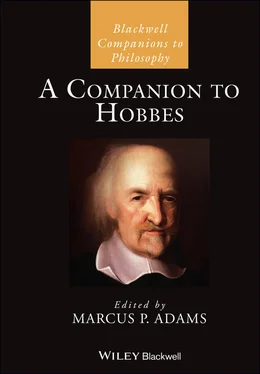In sum, Hobbes places two constraints on philosophers that shape their method. First, he limits them to reasoning, which, equated with computation, brings in the second constraint. Such computation applies only to body, of which there are only two kinds: natural bodies, which are works of nature and the subject of natural philosophy, and the Commonwealth, an artificial body, made by the wills and agreement of humans, which is the subject of civil philosophy. To understand Hobbes’s method for attaining a civil science that rests on true foundations, one must recognize that his natural philosophy encompasses both less and more than Scholastic natural philosophy and absorbs what we call STEM today. Chapter IX of the English edition of the Leviathan divides natural philosophy into knowledge of the consequences of the common accidents of bodies, and of the consequences of their qualities. The former is subdivided into First Philosophy, Geometry, Arithmetic, Astronomy, Geography, Engineering, Architecture, and Navigation. The consequences of bodily qualities are studied by Physics, which is further subdivided into Sciography, Meteorology, Optics, Music, and Logic. 2Unlike De corpore , the Leviathan places Ethics, and Astrology, Poetry, Rhetoric (all three of which De corpore excludes from Philosophy) plus what Hobbes calls “the science of the just and unjust” under Physics (2012, 130–1; 1651, 40–1). The Leviathan limits civil philosophy to knowledge of the consequences of “politic bodies” (2012, 130–1; 1651, 40–1) whereas De corpore further subdivides it into ethics, which treats of human dispositions and manners, and politics, “which takes cognizance of their civil duties” (EW I.11).
Regardless of which classification one follows, for Hobbes, natural philosophy consists in 1) knowledge of first principles, i.e., foundational definitions that provide the starting points for scientific demonstration (First Philosophy), 2) pure and applied mathematics, and 3) a varying collection of crafts useful to human life. Most Scholastics placed First Philosophy under metaphysics, and the rest either under pure and mixed mathematical sciences or under the arts. 3Civil philosophy, for Hobbes, primarily concerns the commonwealth and the duties plus rights of its subjects. Ethics straddles natural and civil philosophy; insofar as it studies human manners and dispositions as qualities of human bodies it belongs to physics, insofar as it draws from them the rights and duties of subjects, it belongs to the new civil science. Contrary to our natural/normative divide, Hobbes places theoretical and practical philosophy on a continuum, with ethics in mid-range. Scholastic metaphysics, as the science of being qua being, and parts of Aristotelian natural philosophy that challenge theology, like the study of the first cause of motion, biology, and the soul ( qua principle of life) have been purged. 4
With the Empusa exorcised, philosophy confined to the study of body and traditional metaphysics firmly under religious control, Hobbes then broadens natural philosophy to include mathematical sciences. Thus the reach of philosophical ratiocination is extended to crafts, like mechanics and engineering, that renaissance philosophers had elevated to scientiae . 5Like his contemporaries, Hobbes defines scientia as knowledge consisting in deductive proofs known as syllogisms. In the ideal type of scientific syllogism, which takes the form of propter quid demonstrations discussed in Aristotle’s Posterior Analytics , one reasons deductively from a premise that identifies the cause or explanatory factor (typically a definition), to its effect or consequence. Aristotle developed rules for constructing logically valid syllogisms, which the beginning of De corpore like most contemporaneous textbooks, covers summarily. Hobbes follows textbooks that combine Aristotelian and Ramist logic, adding a chapter on Method to his Logic. There he makes the standard claim that the deduction of causes through valid syllogistic reasoning is what scientific knowledge aims at:
The end of science [ scientia ] is the demonstration of the causes and generations of things; which if they be not in the definitions, they cannot be found in the conclusion of the first syllogism, that is made from those definitions; and if they be not in the first conclusion, they will not be found in any further conclusion deduced from that.
(EW I.82)
In Leviathan Hobbes spells out how a methodical process of connecting names into propositions, and propositions into deductive proofs known as syllogisms, results in scientia . Reason, he says, is:
attayned by Industry; first in apt imposing of Names; and secondly by getting a good and orderly Method in proceeding from the Elements, which are Names, to assertions made by Connexions of one of them to another; and so to Syllogisms, which are the Connexions of one Assertion to another, til we come to a knowledge of all the Consequences of names appertaining to the subject in hand; and that is it, men call SCIENCE.
(2012, 72; 1651, 21)
When Hobbes claims to have inaugurated a scientia civilis , he means a body of conclusions about the commonwealth that can be deduced syllogistically from methodically attained premises that ultimately derive from definitions. Hence, though I will follow convention and translate “ scientia ” and the corresponding verb, “ scire ,” as “scientific knowledge” and “to know scientifically,” I do not thereby speak of experimental science in our sense. For other forms of knowing, which Hobbes labels cognitio , I employ the broader term “cognition.”
1.2 Hobbes’s Method for Scientific Knowing
With the domain of philosophical ratiocination clearly delimited, Hobbes in Chapter 6of De corpore derives what every method has in common from his definition of Philosophy. This generic definition of method superficially echoes Scholastic views of scientific demonstration.
Therefore, the Method of philosophizing is the shortest investigation of the effect through causes having been cognized, or of the causes through the effect having been cognized . We are then said to know a certain effect scientifically [ scire ] when we both cognize its causes [ and ] that they are; and in which subject they inhere, and in which subject they introduce the effect, and in what manner they make it . Thus, scientific knowledge is τοῦ διότι or of causes; every other cognition which is called τοῦ ὅτι is sense, or imagination or memory remaining from sense.
(Hobbes 1999, 57–8; OL I.58–9, translations of this edition are mine) 6
τοῦ διότι is Aristotle’s term for propter quid demonstrations whereby effects/consequences are syllogistically deduced from causes/reasons. Methodical philosophizing thus produces scientia , i.e., valid causal syllogisms, in the shortest way possible. Hobbes signals that though the final demonstration will be propter quid , the methodical process of arriving at such proofs can take its starting point either from the cognition of causes and deduce their effects, or from the cognition of an effect, and deduce its (possible) causes. 7The mere non-deductive cognition of something lies outside the domain of scientific knowledge although, as Hobbes highlights, ratiocination or computation must begin from the cognition we acquire by sensation that there is an object. Knowing the nature of its causes, that the causes exist, where they reside, and where/how they generate the effect, however, cannot be attained by experience alone. It requires syllogistic demonstration, which Hobbes regards as computation. Hobbes broadens scientia by applying scientific reasoning to the commonwealth, as well as natural bodies, thus yielding conclusions in practical philosophy that have the same status as knowledge of the natural world. But his scientia is narrower than our science since experiential forms of cognition, though they provide starting points for syllogisms, are not themselves part of scientific knowledge. The latter affirms prior Aristotelian views, the former breaks with it. 8
Читать дальше












